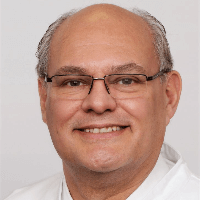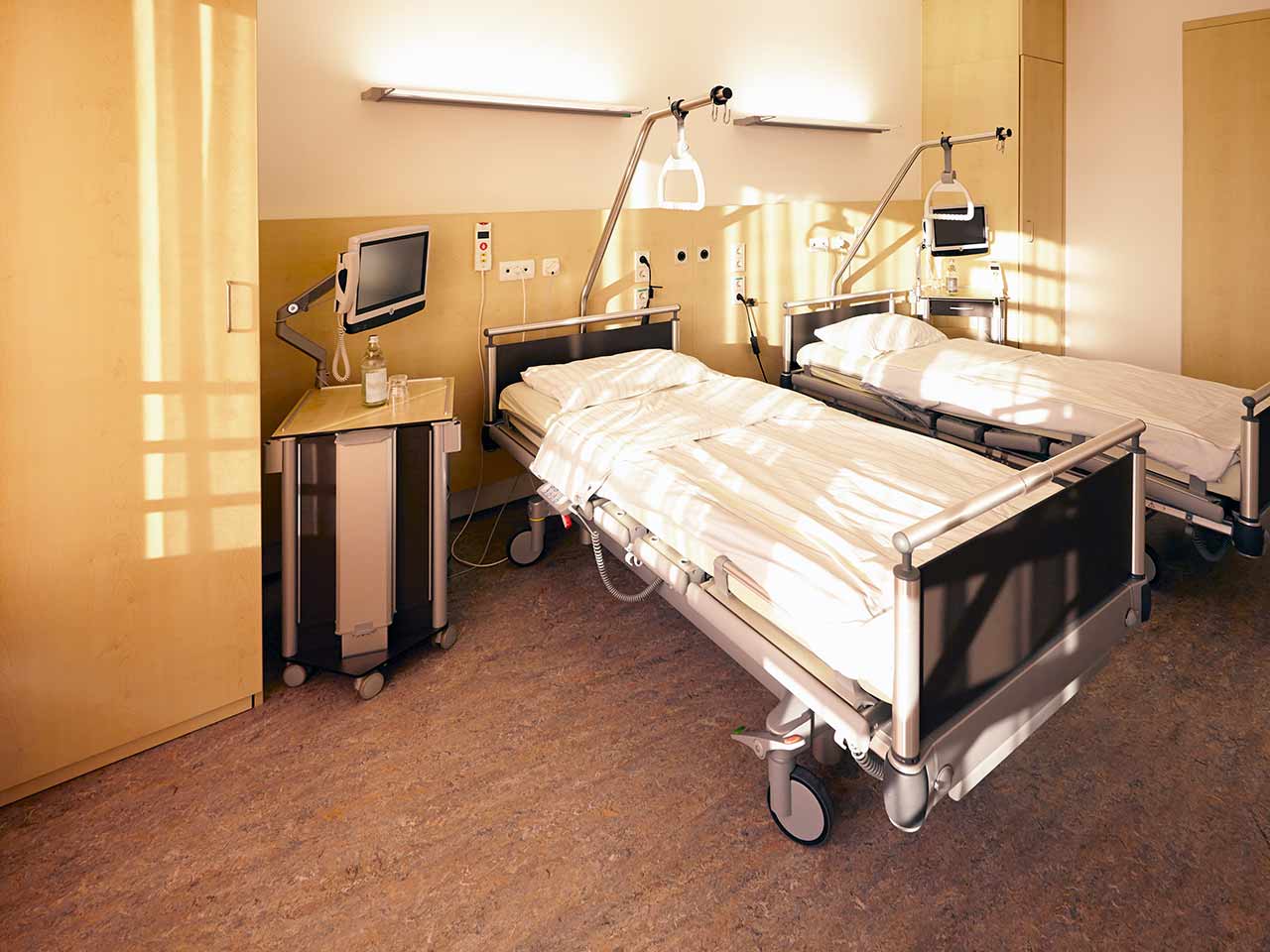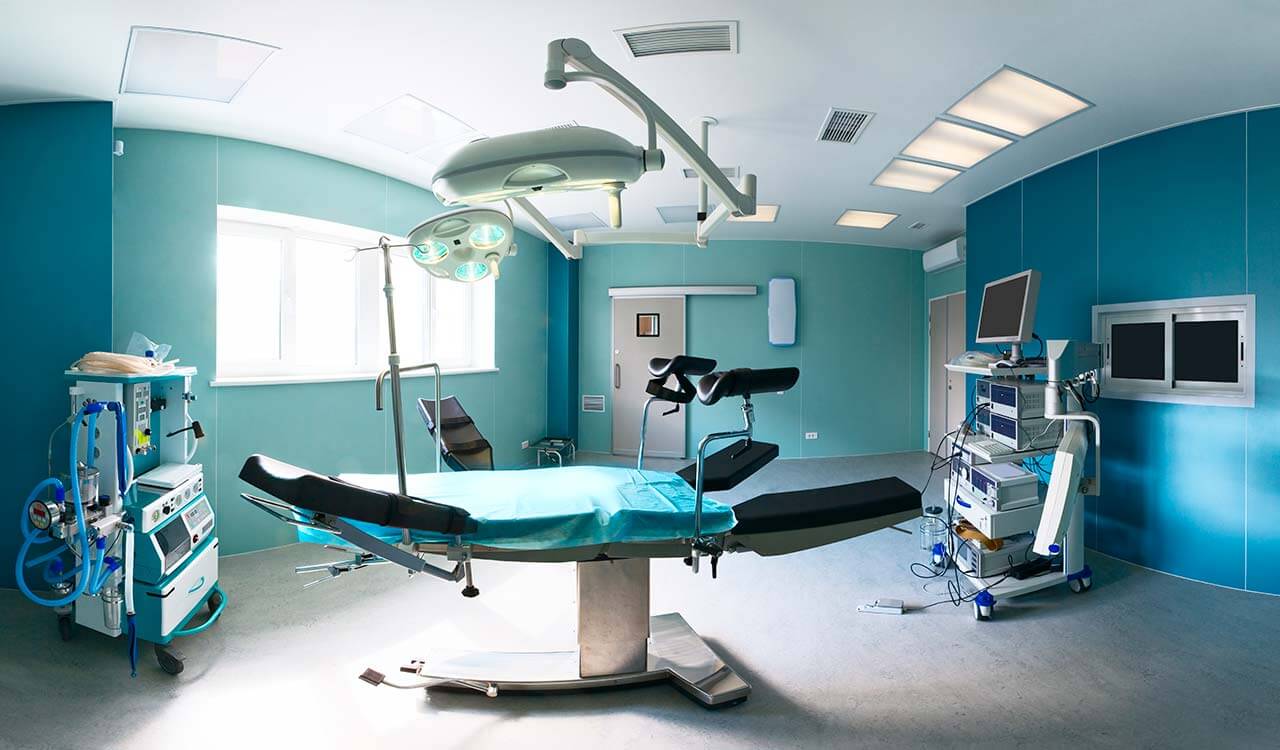
The program includes:
- Initial presentation in the clinic
- clinical history taking
- review of medical records
- physical examination
- laboratory tests:
- complete blood count
- general urine analysis
- biochemical analysis of blood
- inflammation indicators (CRP, ESR)
- indicators blood coagulation
- gynecological examination
- ultrasound examination: pelvis, abdomen
- preoperative care
- plastic reconstruction of the pelvic organs
- symptomatic treatment
- control examinations
- the cost of essential medicines and materials
- nursing services
- full hospital accommodation
- explanation of future recommendations
Required documents
- Medical records
- Pelvic ultrasoud (if available)
- Pelvic MRI/CT scan (if available)
Service
You may also book:
 BookingHealth Price from:
BookingHealth Price from:
About the department
The Department of Gynecology, Mammology and Obstetrics at the Helios Hospital Hildesheim. Dr. Karl-Heinz Noeding offers the full range of medical services in the areas of its specialization. The department provides high-precision diagnostics and effective treatment of diseases of the female genital organs. Of particular interest is the provision of medical care to women with gynecologic cancers. Mammology deals with the treatment of benign and malignant breast diseases. Since 2005, the department has the status of the Breast Center certified by the German Cancer Society and the German Society of Senology. The department also offers comprehensive obstetric services – pregnancy management, childbirth and postpartum care. Three modern delivery rooms are available for childbirth. The department is recognized as the Level I Perinatal Center and delivers more than 1,700 babies every year. Thus, the department is the largest and most reputable medical facility of this kind in the district of Hildesheim. The combination of the advanced technical base of the department with the high professionalism of doctors allows providing patients with high-quality medical care of the European level. The department is headed by Dr. med. Karl-Heinz Noeding.
The direction of gynecology is represented by a highly qualified team of specialists who have a wealth of clinical experience and competent skills for the effective treatment of diseases of the female reproductive system. The primary focus of clinical practice is on the therapy of female genital cancers: cervical, ovarian, endometrial, vulvar and vaginal cancers. Already at the stage of diagnostics, oncologists, radiation therapists, radiologists and other specialists from related medical disciplines are involved in the process. The specialists cooperatively appoint the required set of diagnostic tests, based on the results of which they develop an optimal treatment regimen. The diagnostic protocol for suspected gynecologic cancers usually includes laboratory tests, ultrasound scanning, computed tomography, magnetic resonance imaging, hysteroscopy and biopsy. When planning treatment tactics, the specialists always take into account the type of tumor, its stage, the presence or absence of metastases, the general health of the woman, her age and other important clinical factors. The main treatment methods for female genital cancers available in the department include tumor resection surgery, chemotherapy and radiation therapy. During the interdisciplinary tumor board, doctors individually select the necessary therapeutic measures, determine the duration of the treatment course and its intensity.
The department's gynecologists also have excellent qualifications in the treatment of general gynecologic diseases. The specialists most often have to deal with uterine fibroids, cysts, polyps, endometriosis, uterine prolapse, various infectious and inflammatory diseases of the female genital organs. To make a diagnosis, gynecologists conduct ultrasound examinations, computed tomography, magnetic resonance imaging, etc. Depending on the particular clinical case, the treatment can take place both on an inpatient and outpatient basis. Some surgical procedures can also be performed on an outpatient basis. The department's gynecologists prefer minimally invasive surgical interventions. Such operations significantly reduce the period of postoperative recovery and practically eliminate the risks to the patient's health.
The department also deals with the treatment of urinary incontinence and pelvic organ prolapse. The first-line treatment is conservative therapy: drug therapy, electrical stimulation, biofeedback, special therapeutic exercises to strengthen the pelvic floor muscles, therapy with pessaries, etc. If the above mentioned methods do not give the desired result, surgery then becomes an option of choice. Preference is given to sparing minimally invasive surgical techniques. The surgical options include TVT and TOT sling procedures, strengthening of the pelvic floor muscles by implanting a special mesh and injecting hyaluronic acid into the urethra.
As a certified Breast Cancer Center, the department has all the modern resources for both diagnostics and treatment of breast cancer. If a malignant tumor is suspected, the attending physician thoroughly studies the patient's medical history and appoints diagnostic examinations, including laboratory tests, biopsy, sonography, mammography, MRI, CT, skeletal scintigraphy, radiography, etc. The department cooperates closely with specialists from related medical disciplines – gynecologists, radiologists, specialists in the field of radiation therapy and nuclear medicine, oncologists, psycho-oncologists. With confirmed diagnosis, all the specialists cooperatively develop an individual treatment regimen. To successfully fight cancer, mammologists usually use four therapeutic techniques: surgery, radiation therapy, chemotherapy and hormone therapy. The department's doctors prefer sparing surgical interventions, but, if required, radical mastectomy can also be performed. Since the diagnosis of cancer is always associated with negative emotions, the department employs a team of experienced psychologists who help patients and their relatives cope with depression and apathy, as well as set themselves up for a successful treatment outcome. Upon the completion of the full course of treatment, the doctors of the medical facility recommend regular follow-up examinations in order to prevent or detect recurrence at early stages. Those women who had radical mastectomy can benefit from the services of plastic surgeons. The specialists perform breast reconstructive surgery using silicone implants or the patient's autologous tissue.
The department's obstetricians take care of the health of the expectant mother and baby throughout pregnancy, provide safe childbirth and high-quality postpartum care. The department's patients are under close monitoring of a team of experienced specialists who provide emergency medical care, if required. The medical facility has three advanced delivery rooms. The team of obstetricians focuses on the woman and her baby. In case of the normal course of pregnancy, a woman gives birth naturally. Whenever required, obstetricians perform a C-section. Since the department is the Level I Perinatal Center, it has a special Intensive Care Unit for premature babies and babies with congenital abnormalities. The department carries out various tests, the main purpose of which is to monitor the health of the child. During the individual consultations, the future parents receive valuable information on caring for a newborn child and assistance in preparing for the upcoming childbirth.
The department's range of medical services includes:
- Gynecology
- Diagnostics and treatment of malignant diseases of the female genital organs
- Cervical cancer
- Vaginal cancer
- Ovarian cancer
- Endometrial cancer
- Vulvar cancer
- Tumor resection surgery (if possible, minimally invasive techniques)
- Chemotherapy
- Radiation therapy
- Diagnostics and treatment of common gynecologic diseases
- Endometriosis
- Uterine fibroids
- Cysts and polyps
- Inflammatory diseases of the female genital organs
- Drug therapy
- Minimally invasive surgery
- Myomectomy (enucleation of the myomatous nodes)
- Endometrial ablation
- Minimally invasive and microsurgical interventions for suspected infertility
- Laparoscopic interventions
- Hysterectomy
- Hysteroscopy
- Diagnostics and treatment of urogynecologic diseases
- Urinary incontinence
- Pelvic organ prolapse
- Drug therapy
- Electrostimulation
- Biofeedback
- Therapy with pessaries
- Special therapeutic exercises to strengthen the pelvic floor muscles
- Relaxation training
- TVT and TOT sling procedures
- Reconstructive operations with the implantation of a special mesh
- Hyaluronic acid injections into the urethra
- Minimally invasive interventions
- Diagnostics and treatment of malignant diseases of the female genital organs
- Mammalogy
- Diagnostics and treatment of breast cancer
- Tumor resection surgery (if possible, minimally invasive techniques)
- Chemotherapy
- Radiation therapy
- Hormone therapy
- Diagnostics and treatment of breast cancer
- Obstetrics
- Prenatal diagnostics (ultrasound screening in all trimesters, fetal echocardiography, amniocentesis, etc.)
- Childbirth (natural childbirth, water childbirth, C-section)
- Postnatal care for mother and baby
- Other medical services
Curriculum vitae
Dr. med. Karl-Heinz Noeding studied Human Medicine at the Albert Ludwig University of Freiburg. This was followed by medical practice at the Municipal Hospital in Baden-Baden and at the Hospital Nordstadt in Hanover. In 1994, after successful board certification in Obstetrics and Gynecology, he was appointed as Senior Physician in the Department of Gynecology at the Hospital Nordstadt in Hannover. In 2007, he became the Head of the Department of Gynecology and Obstetrics at the Hospital Grossburgwedel where he worked for over 10 years. Since 2018, Dr. Noeding has been the Head of the Department of Gynecology, Mammology and Obstetrics at the Helios Hospital Hildesheim. Dr. Karl-Heinz Noeding is a recognized expert in the treatment of female gentital cancers and breast cancer in women. He also specializes in aesthetic breast surgery.
Photo of the doctor: (c) Helios Kliniken GmbH
About hospital
The Helios Hospital Hildesheim positions itself as an advanced provider of high-quality medical services at the European level. The medical facility is an Academic Hospital of the Hannover Medical School, thanks to which it can successfully introduce the very latest medical achievements into clinical practice. The hospital is distinguished by the excellent quality of diagnostics, highly effective treatment of pathologies of any severity and the best patient care based on understanding and humane attitude. The history of the medical complex dates back to 1838, so it carefully honors traditions, but at the same time the hospital actively uses innovative diagnostic and treatment methods. The medical team of the hospital consists of more than 1,450 people. The hospital employs highly qualified doctors who are rightfully proud of their treatment outcomes.
The medical facility has 579 beds. The team of doctors working at the hospital treats more than 28,000 inpatients and about 80,000 outpatients every year. The patients from foreign countries often undergo diagnostics and treatment in the hospital, which confirms the excellent reputation of the medical center in the international arena.
The hospital offers highly specialized departments with different medical focuses, including oncology, cardiology, gastroenterology, gynecology, dermatology, otolaryngology, general and abdominal surgery, plastic and aesthetic surgery, traumatology, etc. Many medical fields are awarded with prestigious certificates, including German Cancer Society (DKG) certification, IQM certification, and others.
Photo: (с) depositphotos
Accommodation in hospital
Patients rooms
The patients of the Helios Hospital Hildesheim live in spacious and light rooms. The furnishings of a standard patient room includes an automatically adjustable bed with an orthopedic mattress, a bedside table, and a wardrobe for storing things. All patient rooms have telephone, radio and TV, as well as free Wi-Fi. For maximum convenience of patients, each room has an ensuite bathroom with shower and toilet.
If desired, the patient can stay in an enhanced-comfort room. Such rooms are distinguished by a more sophisticated design, and are additionally equipped with a safe, a minifridge and upholstered furniture.
Meals and Menus
The patients of the hospital are offered tasty and varied meals. Diet and vegetarian menus are also available. If the patient follows a special diet recommended by the attending physician, he will be provided with food cooked from approved products.
Breakfast is served buffet style: eggs, various types of cheese, sausage, buns, jam, vegetables. There are three set menus to choose from for lunch. Dinner is also served buffet style.
In addition, the hospital has a cozy cafe called Leckeria where one can have a delicious snack. The range of dishes includes light salads, hearty set meals, snacks, sandwiches, cakes, as well as tea, coffee and soft drinks. The terrace is open in the summertime.
Further details
Standard rooms include:
Television
All patient rooms have a TV set. The TV can be used with headphones – the patients can use their own headphones or ask for the headphones from the staff.
Religion
The patient can talk with a Christian priest at any time. Divine services are held every Sunday at 10 am (on the ground floor).
Other religious services are available upon request.
Accompanying person
During the inpatient program, the accompanying person can stay with the patient in a patient room or at a hotel of his choice. Our managers will help you choose the most suitable option.
Hotel
During the outpatient program, the patient can stay at a hotel of his choice. Our managers will help you choose the most suitable option.




